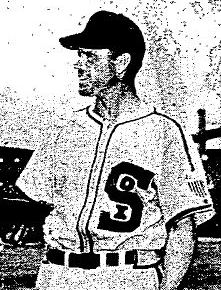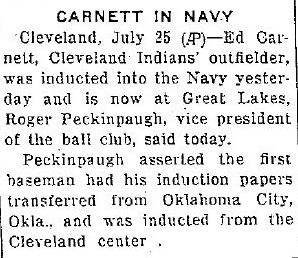Click here for details
Ed Carnett
Date and
Place of Birth:
October 21, 1916
Springfield, Missouri
Baseball
Experience:
Major League
Position:
Outfielder-Pitcher
Rank:
Unknown
Military Unit:
US Navy
Area
Served:
United States
Major League Stats:
Ed Carnett on Baseball-Almanac
 Edwin E. “Ed” Carnett was born on October 21, 1916 in Springfield, Missouri and
moved to Ponca City, Oklahoma at an early age. At 17, he signed as
a pitcher with the local Ponca City Angels – a Chicago Cubs’ farm
team – in the Western Association in 1934. In 1935, he was 19-11
with the Angels and his 16-10 record the following season earned him
a late-season trial with the Los Angeles Angels in the Pacific Coast
League.
Edwin E. “Ed” Carnett was born on October 21, 1916 in Springfield, Missouri and
moved to Ponca City, Oklahoma at an early age. At 17, he signed as
a pitcher with the local Ponca City Angels – a Chicago Cubs’ farm
team – in the Western Association in 1934. In 1935, he was 19-11
with the Angels and his 16-10 record the following season earned him
a late-season trial with the Los Angeles Angels in the Pacific Coast
League.
In 1937, Carnett had a 15-6 record with Tulsa in the Texas League, but also batted
.304 as a part-time outfielder. He was back with Los Angeles in 1938 and the Chicago Cubs gave
him a look in spring training 1939. They sent the left-hander to Milwaukee in the American Association, where his 4-11
losing record prompted a move to
Kansas City in the same league.
Carnett got his first look at the majors on April
19, 1941 with the Boston Braves. He made two unmemorable relief
appearances before returning to
Kansas City. He joined
Seattle
in the Pacific Coast League in 1942 and with that team in 1943, he
told his manager Bill Skiff – after a particularly bad outing with
no offensive support – that he would never pitch again.
He played the outfield and first base for the Rainiers the remainder of the season and batted .300 with
28 RBIs. Carnett was drafted by the Chicago White Sox in November
1943 and played 126 games as a left fielder and first baseman in
1944. He hit .276 with 60 RBIs and even made two relief appearances
on the mound.
The White Sox traded him to the Indians in
December 1944 and he hoped to continue his offensive onslaught in Cleveland. However, Carnett’s draft status was
re-classified 1-A. He was called for a pre-induction physical
examination in Cleveland on May 15,
and ordered by his Oklahoma City draft board
to report for induction July 24. Carnett had played 30 games for the
Indians and was batting .219 at the time.
 |
| Associated Press July 26, 1945 |
Carnett served at the
Great Lakes
Naval Training
Center in Illinois, and while
going through his basic training he
met Bob Feller. Feller was recently returned from active duty
in the Pacific and now managed the Great Lakes
baseball team. Feller was in the process of perfecting a slider to
complement his overpowering fastball and curve. Hearing that Carnett
knew how to throw a slider, Feller had a jeep pick him up from his
outfit and drive him to the baseball diamond. Carnett schooled the
great pitcher on the finer points of the pitch and even donned the
catching gear as Feller worked on his mechanics.
Carnett was discharged from service in the spring
of 1946. The Indians gave him his unconditional release on April 13,
1946, and he played for Vancouver in
the Western International League before being called up to
Seattle.
He became a player-manager for the Wichita Falls
Spudders and Paris Red Peppers of the Big State League in 1947, and
produced his biggest season in the minor leagues in 1948 with the
Borger Gassers. He batted .409 that year with 33 home runs and 161
RBIs. Carnett remained with Borger through 1952,
batting over .300 each year and winning a number of games on the
mound (he was 13-6 in 1950 and 10-6 in 1952).
Carnett then returned to Ponca City in 1954 where he’d started his
professional career 20 years previously. He retired from baseball in
the late 1950s. He took a job running a
country club in Burlington, and later
worked for a chemical company, rising to the level of vice-president
in charge of sales and marketing.
Created December 18, 2007.
Copyright © 2015 Gary Bedingfield (Baseball
in Wartime). All Rights Reserved.


 Edwin E. “Ed” Carnett was born on October 21, 1916 in
Edwin E. “Ed” Carnett was born on October 21, 1916 in 